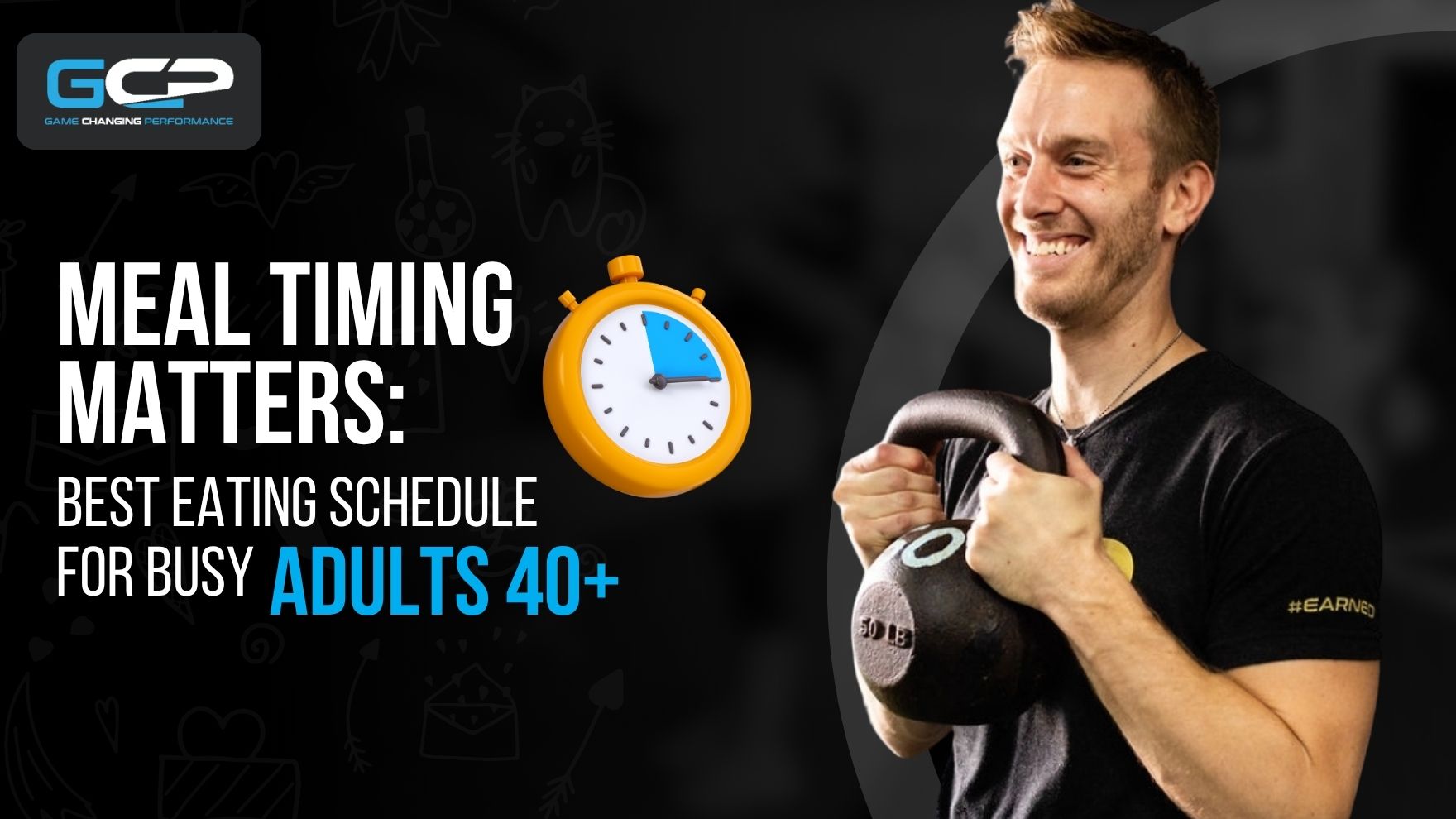
Few Game‐Changing Meal Timing Tips for Adults Over 40 | GCP
Meal Timing Matters: Best Eating Schedule for Busy Adults 40+
You might not have realized this yet, but here we go… Maybe you’ve always believed that having a strong body would carry you through the years. But after 40, you might have started feeling drained, bloated, and off your game. If you’ve ever felt like giving up, you need to hear this, the real culprit isn’t calories alone, it’s your meal timing for adults over 40. And that’s when it hits, shifting when you eat can change everything. Fast forward to today, and things can look very different, at Game Changing Performance, you’ll learn how to make that same powerful shift.
Why Meal Timing for Adults Over 40 Matters
As you age, your metabolism, hormones, and energy cycles naturally shift, meaning when you eat matters as much as what you eat. Proper meal timing for adults over 40 helps stabilize energy, improve digestion, and support long-term weight management.
1. Age shifts eating patterns & health risks
A 2025 study tracking nearly 3,000 older adults found that as people age, they tend to eat breakfast and dinner later and compress their eating window. (Nature) That delay in meal timing for adults over 40 was linked to greater risk for fatigue, depression, and even higher mortality. (Mass General Brigham)
2. Late meals hurt metabolism & weight management
Research suggests that eating too late in the day, especially large energy loads in the evening, can impair insulin sensitivity, lower resting metabolic rate, and stall fat loss. (Frontiers) That means your meal timing for adults over 40 can make or break your progress.
Smart Meal Timing Strategies (Best Eating Schedule After 40)
Timing your meals strategically can boost metabolism, energy, and overall health after 40.
Focusing on balanced meals at the right times helps manage weight and supports muscle maintenance.
3. Start with breakfast importance after 40
Don’t skip it. A timely, protein-rich breakfast helps kickstart metabolism, supports hormone balance and nutrition, and sets energy tone for the day. Have you noticed how skipping breakfast leads to mid-morning crashes?
4. Lunch timing: mid-day anchor
Aim to eat lunch about 4–5 hours after breakfast. That helps sustain energy management, offers a midpoint reset, and keeps your digestive health after 40 running smoothly.
5. Dinner timing & internal clock
Finish your main meal at least 2–3 hours before bed to support metabolism and meal timing and prevent disrupted sleep.
6. Window control & intermittent fasting over 40
Consider a moderate eating window (e.g., 10–12 hours) or intermittent fasting over 40 if it suits your schedule. Studies show time-restricted eating can modestly aid weight, BMI, and metabolic markers.
Meal Timing for Adults Over 40: Practical Tips

Plan meals to support steady energy levels and avoid mid-day slumps.
Incorporate nutrient-dense foods at regular intervals to maintain metabolism and overall wellness.
Focus on protein timing: aim for 25–30g protein at each meal to preserve muscle as you age
Use sustainable meal planning: batch cook or prep to avoid late, random meals
Monitor portion control to avoid calorie overload in fewer meals
Prioritize nutrient-dense foods: vegetables, lean proteins, and whole grains
Avoid heavy meals close to bedtime, as it upsets digestive health after 40
Stay consistent day-to-day; variability disrupts your internal cues
Quick Comparison Table: What Works vs. What Fails
This table highlights effective meal timing strategies versus common mistakes.
Use it to quickly identify what supports energy, weight management, and overall health after 40.
1. Habit
Early, protein-rich breakfast
Eating window of ~10–12h
Dinner 2–3h before bed
Consistent daily schedule
2. Why It Helps
Promotes metabolism, energy, and hormone balance
Aligns with circadian rhythm, better glucose control
Supports digestion and sleep quality
Prevents mood swings, cravings
3.Why It Fails
Skipping breakfast slows metabolism
Late-night eating causes insulin issues
Late dinner raises metabolic stress
Irregular timing disrupts hormone signaling
How This Helps Your Fitness & Weight Loss Meal Timing
When your eating schedule for optimal fitness results matches both your metabolism and natural circadian rhythm, you can maximize energy, improve digestion, and support overall health throughout the day.
You support long-term lifestyle change rather than quick fixes
Your body adapts better to training, recovery, and fat loss
You improve energy management so workouts feel stronger
You keep insulin and hunger signals stable, making weight loss meal timing work for you, not against you
Conclusion
Many busy adults over 40 feel caught between goals and fatigue, juggling careers, family, and health without a clear roadmap. That is the real problem! But your food alone won’t fix it; rather, your meal timing for adults over 40 must match your biology, schedule, and goals. Shift that, and you rewrite your results.
Fast forward to today, because I embraced the power of meal timing for adults over 40, I found more energy, better fat loss, and stronger workouts. Game Changing Performance is built on that same principle: we teach you the timing habits that boost metabolism, hormone balance, and sustainable performance.
Your optimal eating schedule starts now, and your best results are waiting.
Frequently Asked Questions
How many meals a day should adults over 40 eat?
There’s no one answer. Some thrive on three solid meals; others prefer two meals plus a snack. What matters more is consistent meal timing for adults over 40 that matches your energy needs.
Is intermittent fasting safe for people over 40?
Yes, if done thoughtfully. Use a moderate window, get enough protein, and avoid extremes. It can complement your nutrition plan for busy adults.
Does meal timing affect weight loss results?
Yes. Strategic timing supports metabolism and hormone balance, so weight loss meal timing is very real when done right.
How important is protein timing after 40?
Very. Your body’s efficiency at building/maintaining muscle starts to decline, so proper protein timing (spread through meals) is key.
What should I eat before and after workouts at 40+?
Go for moderate carbs + protein before. After, lean protein + veggies work well. Meal timing matters to fuel workouts with nutrition.
How does meal timing support energy levels during the day?
Smart timing avoids peaks and crashes. You maintain steady energy instead of falling into sugar or caffeine traps.
Can proper meal timing help balance hormones?
Absolutely. When your internal clock and food cues align, it better supports hormone regulation like cortisol, insulin, and melatonin.


